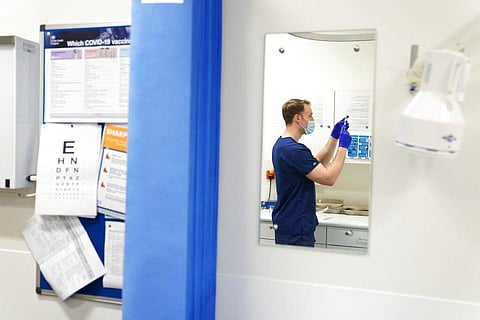

LONDON: The UK reported 93,045 cases of coronavirus on Friday, another record high for daily infections for the third consecutive day, as Omicron overtook Delta to become the dominant variant in London and Scotland.
Of the daily figure, 3,201 new cases were of Omicron compared to Thursday's 1,691 to take the UK's total for the new surging variant to 14,909.
The UK Health Security Agency (UKHSA) said there were 65 patients in England's hospitals with Omicron, with the number of deaths from the COVID-19 variant unchanged at one.
There have been a further 111 coronavirus deaths recorded, down from last week's figure of 120.
In England, the R number, which measures the rate of infection, has risen to between 1.0 and 1.2, compared with last week when it was estimated at between 0.9 and 1.1.
It means every 10 people infected are likely to pass the disease to between 10 and 12 others.
When the value is above 1.0, it means the epidemic is thought to be growing.
Omicron is thought to be much more transmissible than Delta and new research suggests the new variant largely evades immunity from past coronavirus infection or two vaccine doses.
The study from Imperial College London shows that vaccine effectiveness against symptomatic Omicron infection of between 0 per cent and 20 per cent after two jabs, and between 55 per cent and 80 per cent after a booster dose.
Researchers say the risk of reinfection with Omicron is 5.4 times greater than that of Delta, and Omicron is likely to have the same severity but hospital data remains "very limited".
British Prime Minister Boris Johnson has warned that the Omicron variant of COVID-19 is a "very serious threat" and that the country is seeing a "considerable wave coming through".
He said people have "got to be prepared" as he reiterated the government message of "get boosted now".
In Scotland, First Minister Nicola Sturgeon said 51.4 per cent of COVID cases are now likely to be Omicron, making it the dominant variant.
New York state reported Friday that just over 21,000 people had tested positive for COVID-19 the previous day, the highest single-day total for new cases since testing for the virus became widely available.
One day snapshots of virus statistics can be an unreliable way to measure trends, but the new record punctuated a steady increase that started in the western part of the state in late October, and has taken off in New York City in the past week.
Just under half of the positive results were in the city, where lines were growing at testing stations and some Broadway shows and the Rockettes Christmas show were cancelling performances because of outbreaks among cast members.
The steep rise in infections should be of great concern but it was inevitable, given the quick spread of the omicron variant, said Dr. Denis Nash, the executive director of the Institute for Implementation Science in Population Health at the City University of New York.
"We were already headed for a winter surge with delta, which is a very concerning thing in its own right," Nash said.
"But then you layer on top of that the new omicron variant, which is more transmissible from an infection standpoint," he said, noting that current vaccines may be unable to contain the "more invasive" new variant.
Nearly 10,300 of the positive tests reported by the state were in the city, roughly comparable to its share of the state's population.
Statewide, New York averaged 13,257 positive tests per day over the seven-day period that ended Thursday.
That is up 71% from two weeks ago.
The state's previous one-day high for positive tests came on Jan. 14, 2021, when just under 20,000 people tested positive.